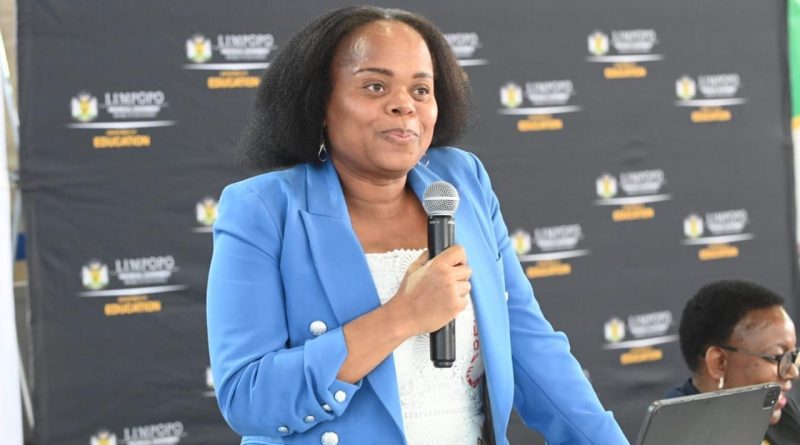Premier Ramathuba pleads unity for quality education
POLOKWANE
Limpopo Premier, Dr Phophi Ramathuba, said the provincial government will continue to prioritize the allocation of resources to ensure that schools in the province are equipped to deliver the quality education the learners deserve.
Ramathuba said when interacting with all the Limpopo high school principals, circuit managers, education district directors and top management from all five districts in the province, during a meeting held at Ngoako Ramathlodi Sports Complex in Seshogo on Monday 12 August 2024.
Ramathuba was accompanied by MEC for Education in the province, Mavhungu Lerule-Ramakhanya, who used the opportunity to get an overview on the first and second quarter learners’ performance for the 2024 academic year.
Ramathuba used the platform to commend the education representatives for the hard work and the impressive matric results achieved by the province in the previous academic year.
“We are all aware of the challenges we face, yet despite these, you have led the education department to achieve a remarkable improvement in our provincial pass rate. From 72.1% in 2022, we have risen to an outstanding 79.54% in 2023. This achievement is a testament to your tireless efforts, innovative strategies, and the resilience of our learners. I am optimistic that with the continued dedication of all stakeholders, Limpopo will soon rank among the top three provinces in the country,” she said.
However, the premier hinted that while the province has much to celebrate, they must also acknowledge the hurdles that lie ahead.
“Our education system is not without its challenges, budget cuts, evolving curricula, the demands of integrating information and communication technology (ICT), and the perennial issue of limited resources are but a few,” she said.
Ramathuba assured that these challenges are not insurmountable and government remains steadfast in its commitment to investing in education.
“We recognize that education is the cornerstone of economic development and social transformation. Therefore, we will continue to prioritize the allocation of resources to ensure that our schools are equipped to deliver the quality education our learners deserve,” she said.
Ramathuba indicated that one of the most pressing issues they face is the achievement gap between learners from different socioeconomic backgrounds, which she said it is a matter of great concern that learners born into lower-income families often face greater obstacles to academic success.
“This is not just an educational issue but a social justice issue. As leaders, it is our duty to level the playing field to ensure that every learner, regardless of their background, has access to the same opportunities and resources. We must confront the reality that our province is predominantly rural. This presents unique challenges, but it also offers us an opportunity to innovate and adapt. Our rural context should not be viewed as a limitation, but rather as a call to action, a challenge to be more creative, more resourceful, and more determined in our efforts to provide a quality education for all,” explained the premier.
She encouraged the educators to encourage learners to apply for government student funding such as Funza Lushaka Bursary Scheme which provides financial support to students who choose teaching as a career.
“We are also exploring additional incentives to attract and retain skilled teachers in our province. But these efforts will only bear fruit if they are supported by a strong commitment from all stakeholders to make teaching a desirable and respected profession,” she said.
Ramathuba commended the education leaders that a pivotal role that each of them plays contributes in the success of the province’s education system.
“As district officials, principals and circuit managers, you are not just administrators, you are leaders. You set the tone, you shape the culture, and you drive the vision of excellence in our schools. Your leadership is what will determine whether our province rises to meet the challenges we face or whether we fall short of our potential,” she said.




